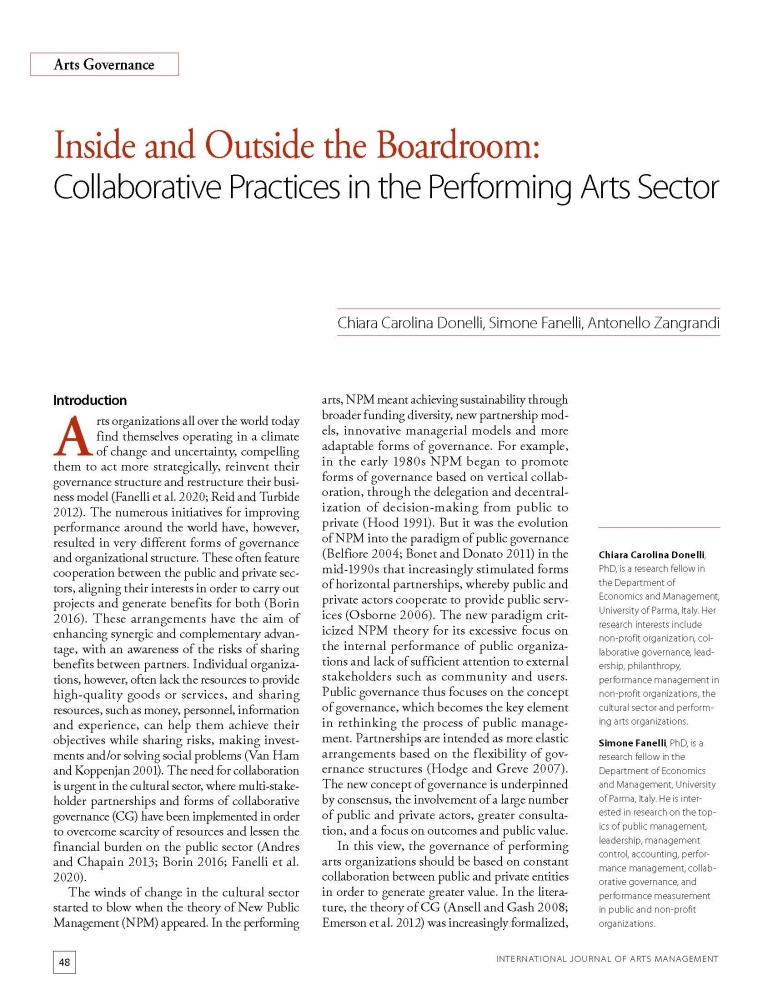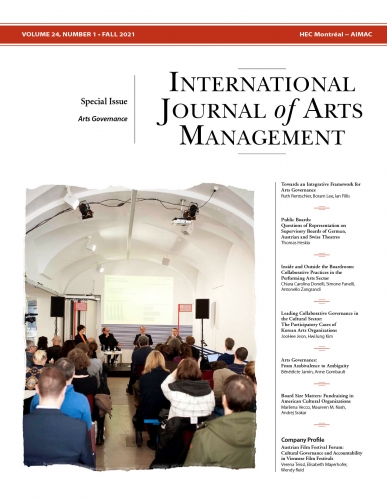Inside and Outside the Boardroom: Collaborative Practices in the Performing Arts Sector
Product: Article
$21.00 CA
Chiara Carolina Donelli, PhD, is a research fellow in the Department of Economics and Management, University of Parma, Italy. Her research interests include non-profit organization, collaborative governance, leadership, philanthropy, performance management in non-profit organizations, the cultural sector and performing arts organizations.
Simone Fanelli, PhD, is a research fellow in the Department of Economics and Management, University of Parma, Italy. He is interested in research on the topics of public management, leadership, management control, accounting, performance management, collaborative governance, and performance measurement in public and non-profit organizations.
Antonello Zangrandi is a professor of Public Administration in the Department of Economics and Management, University of Parma, Italy. His research interests include several topics in public organization, public management control, non-profit organization, health care management, arts management, and performing arts organizations.
ABSTRACT
Collaboration is crucial in the arts sector, where forms of collaborative governance (CG) – the inclusion of private partners in the decision-making process – have been implemented in order to overcome scarcity of resources and to engage with stakeholders. The governance of performing arts organizations today must be based on constant collaboration between public and private entities in order to generate greater value. The purpose of this study is to identify the drivers of CG in performing arts organizations by means of a case study of I Teatri Foundation of Reggio-Emilia, one of the first theatres in Italy to include private partners in governance. The methodology is based on both documentary analysis and interviews. The findings show that CG should be applied at micro and meso levels (inside and outside the boardroom), as both levels contribute to the creation of value for the audience.
KEYWORDS
Collaborative governance, new public management, performing arts organizations, public value, theatres, multistakeholder partnership
RESUME
La collaboration est essentielle dans le secteur des arts, où différentes formes de gouvernance collaborative ont été mises en oeuvre pour pallier le manque de ressources et nouer un dialogue avec les parties prenantes. La gouvernance des organismes des arts de la scène a besoin aujourd’hui de reposer sur une collaboration suivie entre les entités publiques et privées pour générer davantage de valeur. Cette étude vise à déterminer les facteurs qui favorisent la gouvernance collaborative dans les organismes des arts de la scène. L’étude de cas consacrée à la Fondation I Teatri de Reggio d’Émilie, l’un des premiers théâtres d’Italie à inclure des partenaires privés dans sa gouvernance, est utilisée pour explorer la gouvernance collaborative. La méthodologie repose à la fois sur l’analyse documentaire et des entretiens. Les conclusions de l’étude indiquent que la gouvernance collaborative, soit l’inclusion de partenaires privés dans le processus de prise de décision, doit être appliquée aux niveaux micro et méso (à l’intérieur comme à l’extérieur du conseil d’administration), les deux niveaux favorisant la création de valeur pour le public.
MOTS-CLÉS
Gouvernance collaborative, nouvelle gestion publique, organismes des arts de la scène, valeur publique, théâtres, partenariat multi-acteurs

